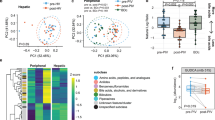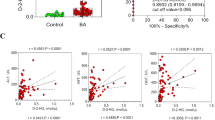Abstract
THE toxicity of bilirubin has been demonstrated in animals. It is known to inhibit brain respiration in vitro1, and to uncouple oxidative phosphorylation in isolated mitochondrias2. Its cytotoxic action on almost every cell in the animal has been recently emphasized by Rozdilsky3.
This is a preview of subscription content, access via your institution
Access options
Subscribe to this journal
Receive 51 print issues and online access
$199.00 per year
only $3.90 per issue
Buy this article
- Purchase on Springer Link
- Instant access to full article PDF
Prices may be subject to local taxes which are calculated during checkout
Similar content being viewed by others
References
Day, R. L., Proc. Soc. Exp. Biol. and Med., 85, 261 (1954).
Zetterstrom, R., and Ernster, L., Nature, 178, 1335 (1956).
Rozdilsky, B., Arch. Path., 72, 1, 8 (1961).
Cameron, G. R., Griffith, H., and Hasan, R., J. Path. Bact., 74, 327 (1957).
Author information
Authors and Affiliations
Rights and permissions
About this article
Cite this article
SCHWARZMANN, V., COUINAUD, C. & BERTHAUX, N. Liver Enzymes in Biliary Retention. Nature 195, 706–707 (1962). https://doi.org/10.1038/195706a0
Issue Date:
DOI: https://doi.org/10.1038/195706a0
This article is cited by
-
?-Lactoglobulins
Nature (1964)
-
Enzym-Muster der menschlichen Leber bei cholestatischer Hepatose
Klinische Wochenschrift (1963)
Comments
By submitting a comment you agree to abide by our Terms and Community Guidelines. If you find something abusive or that does not comply with our terms or guidelines please flag it as inappropriate.



